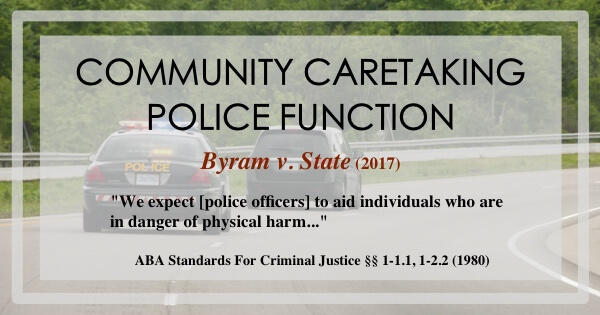
In State v. Weller, the WA Court of Appeals decided an officers’ entry into a garage to privately interview children about their allegations of abuse was lawful under the health and safety check community caretaking exception to the warrant requirement. Also, the seizure of the board the children stated was used by the parents while beating the children, was lawful under the plain view exception to the warrant requirement.
Sandra and Jeffrey Weller had six children in their care. In 2011, CPS became suspicious that the Wellers were abusing the children. Eventually, CPS conducted a welfare check of the family home with the assistance of numerous police officers. The officers did not have a search warrant. Officer Aldridge asked if they could come inside and speak with Sandra and the children.
Sandra stepped back from the door and the officers entered the house. The officers attempted to talk privately with the twins. Officer Jensen and CW talked in one room. Officer Aldridge and CG talked in another room, and ultimately moved into the garage for greater privacy. Both children described being beaten repeatedly with a board.
Officer Aldridge was standing in the same place as when she entered the garage when she looked around and saw a board leaning against the garage wall in plain view. She asked the children if that was the board used to beat them, and they replied that it was. Officers saw what appeared to be bloodstains on the board. Based on her observations, Officer Aldridge decided to remove the twins and the other children from the Weller residence.
After speaking with the children, the State filed multiple charges against the Wellers, including several charges of second, third, and fourth degree assault, and several counts of unlawful imprisonment. At trial, the Wellers tried to suppress the evidence and dismiss the case on theories
The Wellers moved to suppress the board, arguing that it was seized during an unlawful search of their residence without a warrant. They argued that the emergency aid exception to the warrant requirement was inapplicable because there was no immediate threat of injury to any persons and that entry into the house was a pretext for a search for evidence of a crime.
However, the trial court denied the motion to suppress, concluding in a detailed oral ruling that the officers lawfully were in the garage under the community caretaking exception and that they were authorized to seize the board because it was in plain view.
The case proceeded to a jury trial. The jury found Jeffrey guilty on most counts and the trial court sentenced him for five counts of Assault Second Degree, one count of Unlawful Imprisonment, one count of Assault Third Degree of a Child, and two counts of Assault Fourth Degree. The jury also found Sandra guilty on most counts and the trial court sentenced her for four counts of Assault Second Degree and one count of Unlawful Imprisonment. The defendants appealed.
The Wellers argue that the officers seized the board used to beat CW and CG in an unlawful warrantless search of their garage, and therefore that the trial court erred in denying their CrR 3. 6 motion to suppress the board. The Court disagreed, and held that the trial court did not err when it concluded that ( 1) the officers’ entry into the garage to privately interview the children was lawful under the community caretaking function exception to the warrant requirement, and (2) the seizure of the board was lawful under the plain view exception to the warrant requirement. Some background on these legal principles is necessary.
WARRANTLESS SEARCHES
Both the Fourth Amendment to the United States Constitution and article I, section 7 of the Washington State Constitution prohibit warrantless searches and seizures unless one of the narrow exceptions to the warrant requirement applies. The State bears the burden of demonstrating that a warrantless search or seizure falls within an exception to the warrant requirement.
COMMUNITY CARETAKING
The community caretaking function exception to the warrant requirement arises from law enforcement officers’ community caretaking function and involves two aspects: officers rendering aid or assistance ( emergency aid exception) or making routine checks on health and safety (health and safety exception). Another exception to the warrant requirement is the plain view exception, which allows officers to seize an object if they are lawfully present in a constitutionally protected area and the object is in plain view.
A search pursuant to the community caretaking function exception must be totally divorced from a criminal investigation. The exception does not apply where an officer’ s primary motivation is to search for evidence or make an arrest.
Here, the Court reasoned that the officers entered the garage because they were trying to find a private place to interview the children in conjunction with their welfare check. Nothing in the record suggests that the officers were searching the garage or looking for evidence.
HEALTH AND SAFETY CHECK INSPECTION
To invoke the health and safety check exception, the State must show that ( 1) the officer subjectively believed someone needed health or safety assistance, and (2) a reasonable person in the same situation would believe that there was a need for assistance, and ( 3) there was a reasonable basis to associate the need for assistance with the place searched. Next, the State must show that the encounter under this exception was reasonable, which depends upon a balancing of the individual’ s interest in freedom from police interference against the public’ s interest in having the police perform a community caretaking function.
Here, the Court reasoned that the three requirements for application of the health and safety check exception clearly were satisfied. The officers subjectively and reasonably believed that the Weller children needed health or safety assistance. A trained CPS investigator relayed to the officers her professional opinion that the Weller children were not safe and were expressing severe fear.
PLAIN VIEW
The ” plain view” exception to the warrant requirement applies when officers ( 1) have a valid justification for being in a constitutionally protected area, and ( 2) are immediately able to realize that an item they can see in plain view is associated with criminal activity. The test for determining when an item is immediately apparent for purposes of a plain view seizure is whether, considering the surrounding circumstances, the police can reasonably conclude that the item is incriminating evidence. Officers do not need to be certain that the item is associated with criminal activity – probable cause is sufficient.
Here, the Court decided the officers were lawfully present in the Wellers’ garage. Further, the surrounding facts and circumstances led the officers to believe that the board was evidence of a crime. As the welfare check progressed, the children said Mr. Weller periodically beat them with a board. Further, when the officers were in the garage, the children began to look for the board. And the children immediately confirmed that the board in the garage was in fact the board used to beat them. As a result, the Court held that the plain view exception to the warrant requirement applied to the officers’ seizure of the board.
The Court of Appeals upheld the convictions.
Please contact my office if you, a friend or family member are charged with a crime. Hiring an effective and competent defense attorney is the first and best step toward justice.











